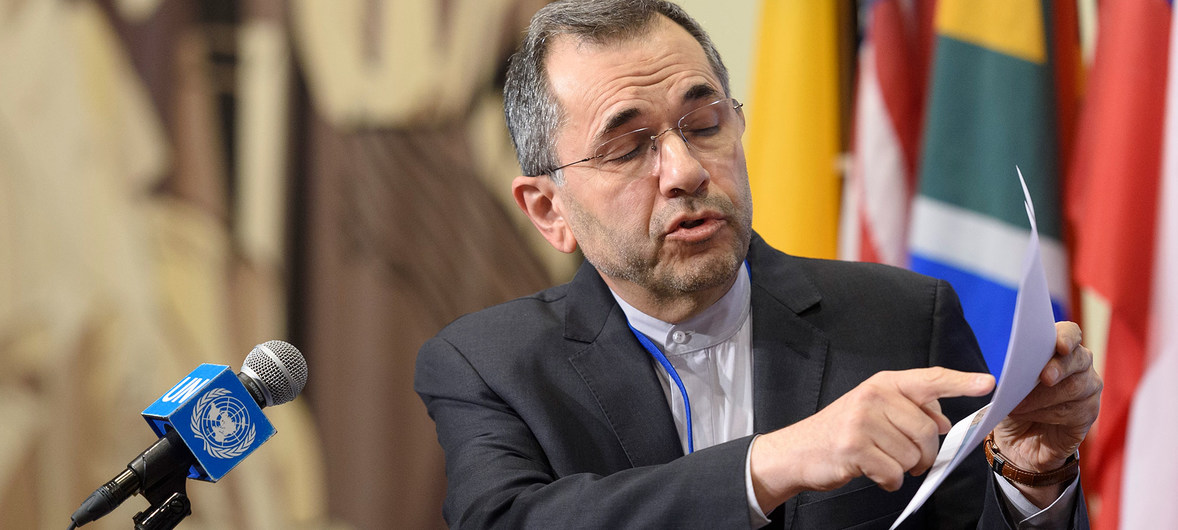No Intention to Quit JCPOA Despite Nuclear Rollbacks

EghtesadOnline: Europe should take further measures to ensure that the special trade channel set up to keep trade with Iran afloat satisfies Tehran's demands, a senior diplomat said on Saturday, while stressing that the country does not intend to leave the nuclear agreement.
"I personally believe that INSTEX, in its current condition, isn't enough. This mechanism without money is like a beautiful car without fuel," Iran's ambassador to the United Nations, Majid Takht-Ravanchi, told the media in New York, IRNA reported.
In early May, a year after US President Donald Trump pulled out of the 2015 Iran nuclear agreement, Tehran announced a decision to abandon some of its commitments under the deal, officially known as the Joint Comprehensive Plan of Action.
Iran would resume higher uranium enrichment in 60 days if the remaining signatories fail to make good on promises to shield its oil and banking sectors from the reimposed and tightened US sanctions, Financial Tribune reported.
On Friday, the European Union announced in a statement that the Instrument in Support of Trade Exchanges or INSTEX, the financial mechanism set up by France, Britain and Germany to facilitate some trade with Iran, is now operational and the first transactions are being processed.
The EU was due to supply a modest €3 million (£2.7 million) credit line to kick-start the mechanism as a signal of good intent, according to the Guardian.
However, Iranian officials have indicated that such efforts are insufficient because European countries are not buying Iranian oil, the key demand for it to stay in the painstakingly negotiated nuclear accord.
Tangible Measures
Takht-Ravanchi said the Europeans asked Iran to remain in the JCPOA.
“We waited a year as they requested, but we told our European counterparts that they need to take tangible steps to maintain the nuclear deal. Mere statements in support of the pact don't resolve our problems," he said, adding that Iran cannot be expected to single-handedly abide by a multinational deal without receiving its benefits.
"Since the US withdrawal from the JCPOA, the Europeans haven't done anything tangible, that is, the JCPOA doesn't function well. We can't keep our end of the bargain unilaterally and not benefit from it."
The envoy said the deadlines set by Iran do not amount to issuing threats.
"We can't wait more. We are not threatening anyone. We haven't issued ultimatums to others. We have told them our plans that if they don't do anything, we will reduce our commitments. We will take new steps if they live up to their commitments or responsibilities."
Takht-Ravanchi also dismissed speculations that Tehran plans to leave the pact, explaining that Iran's planned steps are different from it abandoning the agreement. "We have said several times that if banking and other parts of the JCPOA are realized, Iran will return to its commitments."
"If this situation continues, it means that they don't respect their commitments," he said.
The ambassador said Iran is ready to help save the nuclear deal, urging other signatories to fulfill their part of the commitment.
Wrong Policies
Takht-Ravanchi said regional problems are rooted in the wrong policies of the US administration toward Iran.
"We believe that the chaos in the Persian Gulf is because of the United States’ anti-Iran policies. The US left the JCPOA and sanctioned Iran. Sanctions, not extending the waivers, sending a naval group to the region are meant to provoke Iran," he said, noting that Iran has shown self-restraint so far.
The envoy noted that the US "maximum pressure" campaign against Iran will not achieve the intended results.
“It has only increased tensions in Tehran-Washington relations and in the region,” he told reporters.
On Trump's offer to negotiate with Iranian leaders, he said, "The law of negotiations is respecting the other side. The Americans aren't ready for this. They want to play the Big Brother [role]. If they respect the Iranians, they will be respected and if they attack, they will see a firm response."
Takht-Ravanchi declared that it would benefit everyone, if regional countries put aside their hostilities and decide to cooperate with each other to promote peace.


